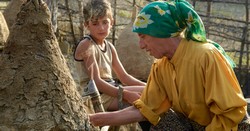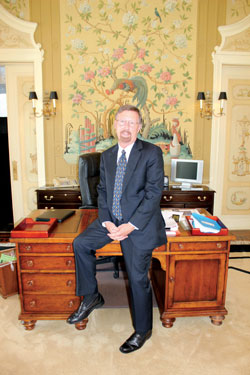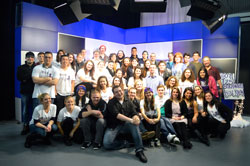The fourth installment of this year’s World Cinema Series analyzed the 2019 documentary drama Honeyland with virtual discussion led by Monmouth faculty Pedram Daneshgar, Ph.D., Associate Professor of Biology and Mihaela Moscaliuc, Ph.D., Associate Professor of English, on Thursday, March 11.
Honeyland focuses on Hatidze Muratova, a beekeeper from the Macedonian village of Bekirlija, and her traditional, environmental-friendly practices to sell the honey that she gathers from her bees. Problems arise when the family of Hussein Sam move to Bekirlija and begin using methods far less sustainable than those practiced by Hatidze that only bring damage to her way of life and the village’s local environment.
“Honeyland really takes us to the heart of the fragile balance between humans and nature,” said Thomas Pearson, Ph.D., Professor of History and Anthropology. “It was an international sensation. At the end of 2019, there were a lot of critics who called it the best film of the year.”
The docu-drama won all of the top honors at Sundance in 2019 and became the first international film to be nominated for an Oscar in both the Best International Feature and Best Documentary categories in 2020.
“The two directors of the film and the producer emphasized after they finished production and the festival circuit that the film does not really seek to demonize anyone,” said Pearson. “It obviously puts Hatidze in a very favorable light, but even though Hussain Sam is trying to make a quick buck from the honey business, their argument is that they’re not trying to demonize him. What they are raising is the problem that people have a willingness to exploit natural resources without considering the damage to their neighbors or the long term health of the environment.”
Daneshgar was one of the featured speakers who led the discussion. Daneshgar spoke about the scientific significance behind “Honeyland” and the recurring themes regarding sustainability.
“In my opinion, the bees are the star of the film, more so than Hatizde and Hussein,” said Daneshgar. “I was really taken with their story and the tragic story of what eventually happens to them. We see that many of the bees die off, and it’s not an uncommon story. Right now, the U.S. has half as many bees as we did 10 years ago. Bee populations are consistently on the decline.”
“Bees work particularly hard during those warm months when flowers are available, flying around to gather pollen and nectar. They consume some of it, but the majority is brought back to the hive to help sustain it throughout the year when the flowers are no longer available,” he explained. “The overharvesting of the honey by Hussain deprived the bees’ ability to stay warm during the winter. Since his bees no longer had a food source, they had to prey on other hives to get the sugar to stay alive and keep their colony warm.”
Hatidze’s philosophy on beekeeping focuses on agricultural sustainability. “You take some for you, you take what you need, but you don’t take too much so that the hive can sustain itself,” explained Daneshgar. “Hussein Sam ultimately makes the mistake of having too much of a commercialist nature motivated by profit and demand, overharvesting what was available. We see kind of an overexploitation of resources here, which ultimately leads to tragedy.”
The second speaker, Moscaliuc, led the rest of the discussion with an analysis of the environmental and cultural messages raised by Honeyland.
“We see two characters who are both dependent on natural resources for survival. They represent two different stances regarding how this dependency works,” said Moscaliuc. “Their attitudes are shaped, to some extent, by their different circumstances.”
“Hussein is a migrant cattle farmer who works hard to feed a large family. His struggle to provide for them isn’t that dissimilar to Hatidze’s effort to care for her mother,” she explained. “However, Hussein sees bees as a seasonal, temporary endeavor that can help him supplement his income. He does it in a hurry as a novice who is not interested in being a real apprentice. He has no history with the bees and no history with their habitat or their habits.”
“By contrast, Hatidze proudly sells her honey at the market herself. For me, Hatidze is a model of sustainability,” said Moscaliuc. “I think she also embodies this concept of conditional hospitality. She understands our position as guests to the home that is Earth. There are consequences to being bad guests. The bees are not hers. She’s a beekeeper, not an owner. She is a guest in their world.”
IMAGE TAKEN from IMDB.com




